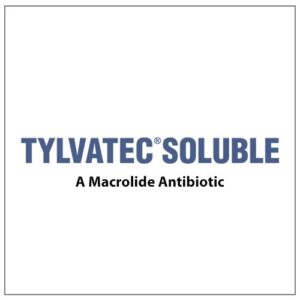TYLVATEC SOLUBLE
62.5% w/w Tylvalosin as Tylvalosin Tartrate
Tylvalosin, a macrolide antibiotic, acts by inhibiting protein synthesis, is highly active against mainly gram-positive bacteria, mycoplasma and some gram-negative bacteria. It exerts both bacteriostatic and bactericidal activity, demonstrating concentration and time dependent killing. It also acts intracellularly by reaching relatively high intracellular concentrations in phagocytic cells (macrophages and neutrophils) helping the innate immune system.
Composition
62.5% w/w Tylvalosin as Tylvalosin Tartrate.
Indications
- Treatment and metaphylaxis of Mycoplasmosis caused by susceptible strains of Mycoplasma gallisepticum, M. synoviae, other Mycoplasma species and diseases associated with Clostridium perfringens and Ornithobacterium rhinotracheale.
Benefits
- Excellent activity against Mycoplasma gallisepticum, M. synoviae, Clostridium perfringens & ORT.
- Very low MIC and low MMC/MIC ratio, compared to other treatment choices, ensuring clinical efficacy.
- Reduces and eliminates Egg Apex Abnormalities (EAA) associated with MS in commercial layers.
- Good palatability unlike Tiamulin, with no drop in water, feed consumption or egg production.
Recommended Dosage
| Bird Type | Dosage Form | Dosage |
| Commercial Broilers and Layers | Water soluble | 20-25 mg tylvalosin/kg body weight for 3 days in day-old chicks |
| 15-25 mg tylvalosin/kg body weight for 2-3 days in the 3rd week | ||
| Food Premix | 50 ppm tylvalosin in the 1st and 3rd weeks | |
| 30 ppm tylvalosin for the first three weeks continuously | ||
| Breeders | Water soluble | 25 mg tylvalosin/kg body weight for 3 days for day-old chicks |
| 15-25 mg tylvalosin/kg body weight for 3 days in the 5th, 9th, 13th, and 17th weeks | ||
| Food Premix | 50 ppm tylvalosin for 1 week every 4 weeks till end of lay | |
| 30 ppm tylvalosin continuously till end of lay |
Withdrawal Period
Meat and Offal: 2 days
Eggs: Nil
Presentation
100 g, 500 g & 10 kg


